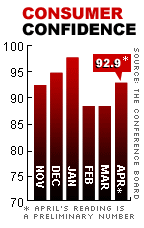NEW YORK (CNN/Money) -
Consumer confidence soared in April, according to a survey by the Conference Board, easily topping forecasts.
The business group's index, based on a survey of 5,000 U.S. households, rose to 92.9 from an upwardly revised 88.5 in March; 88.5 was also the Briefing.com analysts' consensus.

"This latest improvement in consumer confidence was sparked by a more favorable assessment of current business and labor market conditions and increased consumer optimism about the next six months," said Lynn Franco, director of the Conference Board's Consumer Research Center, in a statement. "The job market, which has a major impact on confidence, appears to be gaining strength."
The federal government's March employment report showed a gain of 308,000 jobs, the best one-month gain since late 2001. Despite that report, other surveys of consumer sentiment in April from the University of Michigan and from ABC and Money magazine found confidence to be lower.
Franco said the difference between the findings in her group's survey and the other two could be a matter of timing -- the Conference Board's survey collected opinions through last week. But she said even with the upbeat finding in her survey, it was too soon to say that confidence had taken a long-term change of direction.
"Until we see sustainable strong growth in the labor market, we're likely to see some volatility in the overall index," Franco told CNN/Money. "It's going to depend on putting back-to-back months of good news on the jobs reports to convince the consumer."
Psychological boost
Still it's not surprising to see a confidence get at least a short-term lift from the improved employment outlook, said Oscar Gonzalez, economist with John Hancock Financial Services.
"We've waited so long for good news on the jobs front that even just one month of significant recovery was enough to significantly lift consumer spirits," he said. "Even higher energy prices, continued fighting in Iraq and terrorist actions abroad couldn't overshadow the apparently brightening labor picture."
Consumer confidence is important because of a strong correlation that generally exists between consumer spending and confidence levels. And consumer spending accounts for more than two-thirds of the U.S. economy.
The Conference Board survey found consumers having both a better view of the current economy and the future outlook.
The survey's present situation index rose to 90.6 from 84.4, while its expectations index increased to 94.5 from 91.3. Consumers who believe jobs are "plentiful" increased to 15.8 percent from 14.7 percent a month ago. Those consumers were still outnumbered by the 27.6 percent who believe jobs are "hard to get," although that reading fell from 29.9 percent a month earlier.
"While improving consumer confidence probably suggests downside protection against a slump in spending, it does not suggest we will see spending take off," said Gonzalez. "We still need a sustained improvement in the jobs market, including a significant decrease in unemployment with a solid increase in real wages."
"Looking ahead, I do think, however, that we may see confidence tempered by concern over rising interest rates and a possible slump in the housing market," he added.

|

